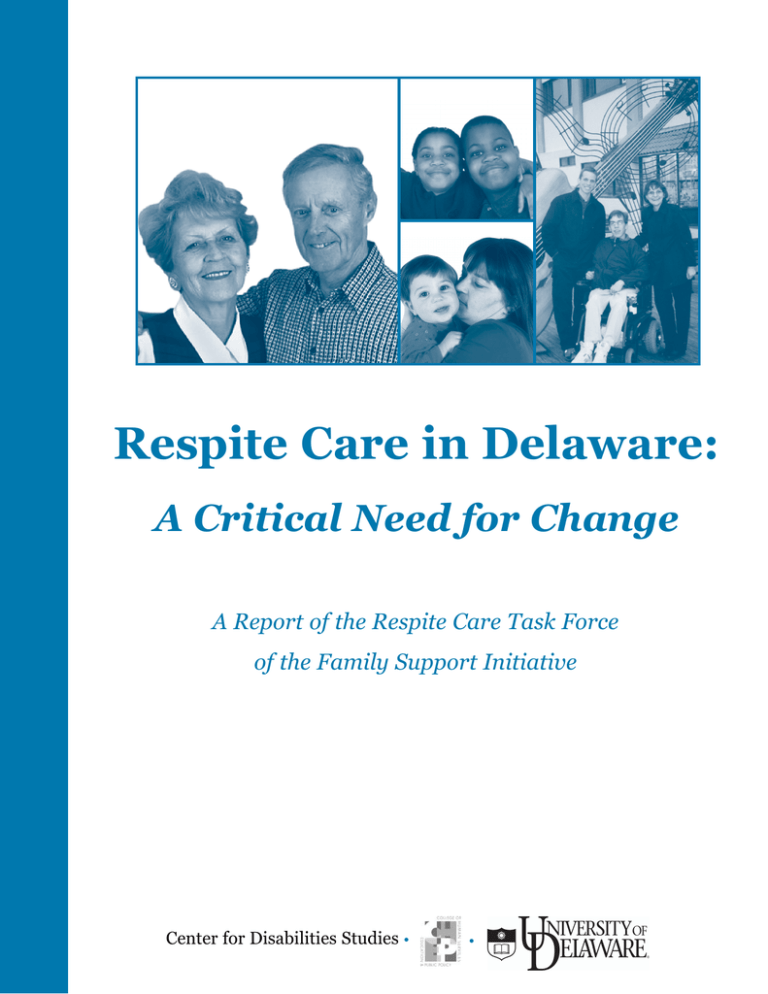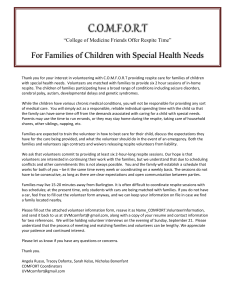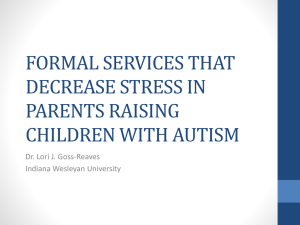Respite Care in Delaware: A Critical Need for Change
advertisement

Respite Care in Delaware: A Critical Need for Change A Report of the Respite Care Task Force of the Family Support Initiative Center for Disabilities Studies • • Respite Care in Delaware: A Critical Need for Change A Report of the Respite Care Task Force of the Family Support Initiative Center for Disabilities Studies • College of Human Services, Education, & Public Policy • University of Delaware Fall 2003 Contents Introduction 2 Executive Summary 3 Summary of areas discussed by the Task Force 4 One family’s story: An illustration of the need for respite services 4 Public Respite Providers 6 Private Respite Providers 7 Lifespan Respite Programs in Other States 8 Progress toward National Legislation 9 Critical Recommendations 10 Additional Recommendations 10 The profound impact of respite services: The Wilds 11 Future Opportunities 12 Task Force Members & Staff 12 Introduction The goal of the Delaware Family Our Mission Support Initiative, funded by the Respite care has been identified as a major need Administration on Developmental in Delaware across disability groups and ages. The Respite Care Task Force consists of family Disabilities, is to ensure that famimembers and professionals. The major goal of lies with members with disabilities the task force is to review all respite policies and receive the services they need so services across the state and make policy and that their family members can live practice recommendations. at home or in the community regardless of age or disability. The Initiative has several major objectives, including the following two related to respite care: Defining Lifespan Respite Care The task force has adopted the definition proposed by the Association of University Centers on Disabilities in October of 2002. “Lifespan respite is the provision of community-based planned or emergency shortterm relief to primary caregivers from the demands of ongoing care for an individual of any age with special needs. Special needs include short-term relief in crisis situations to families or caregivers where there is potential for abuse, neglect, or domestic violence. Additionally, special needs may include any disability, any chronic or terminal physical, emotional, or mental health condition requiring ongoing care and supervision, including Alzheimer’s disease and related disorders, developmental disabilities, 1 children with special medical needs, and any other condition determined by the state.” Respite Care Task Force The task force was developed to examine how respite care was being provided in the State of Delaware. It was also charged to make recommendations on how to better serve families who have respite care needs in the State. The five major responsibilities of the task force are: • • • • • Review current Delaware policies, practices, procedures, and regulations related to respite; Collection of information of respite policies, practices, and regulations in other states; Development of recommendations for addressing respite care in a family-friendly fashion in Delaware; Lead in advocating for change within state and community agencies; and Submit a formal report outlining the issues and making recommendations. 2 Respite Care in Delaware: Respite Care in Delaware: A Critical Need for Change Executive Summary The Respite Care Task Force was developed as part of the Delaware Family Support Initiative. The task force, comprised of parents and professionals, began working in the spring of 2002, and their efforts have culminated with this initial report. Through talking with parents and other caregivers it has become obvious that respite care is clearly one of the most important services that a family can receive if they have a child or adult with a severe disability living in the home. Many caregivers face health and emotional problems due to the stress of being the primary support person. In addition, people providing ongoing care sometimes experience feelings of desperation, depression, frustration, and isolation. Many caregivers face health and emotional problems due to the stress of being the primary support person. An occasional break, or respite, from the extraordinary demands of providing constant care can strengthen the stability of families. Families receiving respite assistance will have less stress, and their family member with a disability will more likely not need a residential placement at public expense. Because of the extraordinary need for respite care, the task force examined the availability of public and private respite services in Delaware, model programs throughout the nation, and pending national legislation on lifespan respite care. Recommendations based on this research were developed. An occasional break, or respite, from the extraordinary demands of providing constant care can strengthen the stability of families. Four critical recommendations include state and federal legislation to support the development of statewide lifespan respite care, distribution of a survey to obtain a definitive idea of how much respite care is needed throughout the State, and the development of a comprehensive directory of all available respite services in Delaware. Finally, the task force feels that a new “Family Support Medicaid Waiver” will help provide the needed funds for increased respite services. A number of other recommendations that can further enhance respite services throughout Delaware are listed at the end of the report. Supporting the efforts of families and caregivers at home is cost-effective, humane, and critical in the provision of quality community-based services in Delaware. A Critical Need for Change The task force hopes to continue its work in the future to ensure Delaware provides this vital service to families who are currently their family members’ only caregivers. Needless to say, the benefits of respite care are obvious. Supporting the efforts of families and caregivers at home is cost-effective, humane, and critical in the provision of quality community-based services in Delaware. 3 Summary of the Areas Discussed by the Task Force The task force held regular meetings beginning March 2002. The following are brief descriptions of the key topics discussed. • Review of most of the major public respite programs in the State, including significant information on the Division of Developmental Disabilities Services (DDDS) respite program from information provided by DDDS and interviews with two key members of the DDDS staff. • Review of the state respite programs available through the Division of Services for Aging and Adults with Physical Disabilities, the Division of Family Services, and the Department of Education (DOE). DOE’s program is for families whose children are enrolled in the Delaware Autism Program (DAP). One family’s story: An illustration of the need for respite services My name is Ann Phillips and I am the primary caregiver for my 20-year-old son, Aaron. Aaron was in a car accident in December 2000 that left him with a T-4 spinal cord injury, which means he is paralyzed from the chest down. He also sustained a traumatic brain injury. This injury is more complicated to explain in terms of deficits but these deficits are the reason he needs a caregiver 24 hours a day. At the time of the accident I had been remarried just 3 years and working outside my home. Aaron spent almost two months in intensive care, followed by four months in a rehabilitation hospital. When Aaron returned home in June 2001, I was forced to resign from my job to become a fullverbal cues from me, and still time caregiver for Aaron. My needs at least one hour to husband and I had been plan- complete dressing. He then ning early retirement, which requires significant assistance immediately became unrealis- to transfer into his wheelchair. tic, as we are forced to depend He requires constant supervion his medical insurance to sion for all other routine tasks, pay for many of Aaron’s “My priority is my entire family, not medical needs. In addijust Aaron, and I would like my life to tion, Aaron’s older be more balanced. Respite care would brother Richard, who had graduated from provide the opportunity to give all college seven months family members sorely needed breaks.” earlier and was working full-time as a including brushing his teeth, computer programmer combing his hair, taking his in Philadelphia, medication, weight shifts that changed his plans to deter skin breakdown, etc. We move out of our home had intercom systems installed so he could be of assisin the house so we can monitance to the family tor him at all times, as he is when not at work. prone to seizures. A typical day He has many different starts early in the morning ongoing medical needs and when I either dress him or issues that require constant have him try to dress himself. care and supervision, as well This is a significant challenge, as frequent trips to doctors, as Aaron requires numerous specialists, and surgeons. I 4 Respite Care in Delaware: Summary of the Areas Discussed by the Task Force continued • Review of respite programs conducted by private agencies including the Mary Campbell Center, Easter Seals, and United Cerebral Palsy (UCP). Easter Seals and UCP have comprehensive respite programs including summer camps. • Review of other states’ programs on lifespan respite including Oregon, Wisconsin, and Nebraska. These three states have developed very strong, statewide programs based on legislation. • Review of publications on lifespan respite produced by the National Respite Coalition and 2 the ARCH National Respite Network and Resource Center. • Review of federal legislation, including the “Lifespan Respite Care Act of 2002.” A Senate Bill sponsored by Senator Hillary Clinton, S.2489 was reintroduced in 2003 as S.538. The passage of S. 538 would greatly assist the development of lifespan respite care in all states. continually work with him performing physical therapy as well as cognitive improvement activities. At bedtime, he requires significant assistance with his shower, transferring to his bed and his toileting needs. In addition, he must be turned from side to side every two hours throughout the night. His brother, stepfather, and I take turns so we can all sleep a few hours at a time. However, this is very taxing schedule for all of us. We are entitled to several hours a day of home health aide care. Though it is welcome assistance, it is unreliable since the hours frequently go unfilled. When I need to attend to myself, for things such as doctor or dentist appointments, my husband must take a day off of work for me, as Aaron cannot be left alone. There was a recent death in our family, which required us to attend an out-of-town A Critical Need for Change funeral that required a 4 1/2 hour car ride. That trip was too long for Aaron, and required my oldest son to take a day off to stay home with Aaron, and also required my husband and I to drive there and back in the same day because I am the only one who takes care of Aaron’s bowel regime and other hygiene needs. Maintaining friendships has proved to be almost impossible. My time is not my own, and though people are sympathetic, they usually grow impatient at my lack of inflexibility, my inability for spontaneity, and my need to be home in the evenings. This has also had a negative impact on my marriage. The stress levels in our home have been quite high, and have necessi- 5 tated therapy for my husband and I, and require the therapist to come to conduct sessions in our house, since just trying to arrange one hour per week to leave the house together only added to our stress. All of our individual and family activities require careful strategic planning. Everything from food shopping to going out to dinner, to seeing a movie requires planning and support. I love my son dearly, and I am grateful that he is home with us. It truly is a joy to see him enjoy his life to the fullest, while working harder than anyone can imagine. The fact remains there isn’t a time in my day when I am not either doing something for him, to him, or with him. Public Respite Providers The task force examined State of Delaware agencies regarding their public respite care programs. The Division of Developmental Disabilities Services (DDDS) has had a respite program for many years. “Respite Policy and Guidelines” was published in 1998 with a revision in May of 2001. The task force understands that further revisions are currently under consideration. Funds for respite care in DDDS have not increased for several years. The May, 2001 revision of the “Respite Policy and Guidelines” indicates that, “a maximum of 24 days (240 hours) shall be afforded to all natural families without charge, contingent on the availability of resources.” Since resources have not increased but demand has, DDDS finds its respite program 3 in a difficult situation. The Division of Family Services (DFS) has two respite programs. One is specifically for foster parents in which other foster families typically provide respite services with compensation at the rate of $20.00 per day. DFS clients may receive between seven and fourteen days of respite per year. The other respite program is for families who have adopted children, however, 4 the funding for this program may no longer be available. The Division of Services for Aging and Adults with Physical Disabilities (DSAAPD) has a program called “Care Delaware.” This program is funded through a Title 111-E Older Americans Act grant. The grant is intended to help families care for persons (60+ years) at home so they may remain in the community. The grant also supports grandparents and older relatives (60+ years) who are raising grandchildren and/or nieces and nephews age 18 or younger. DSAAPD also has a program called “Statewide Expansion.” The program “provides respite services to caregivers of at risk adult persons who are infirmed, disabled, or chronically ill. Priority is given to those at risk of losing supports necessary for self-maintenance, institutionalization, abuse or neglect, functional loss, harm to self or others, and because basic health, safety and welfare are not being met through current supports. The program is statewide and can occur 5 in the home or an institutional setting.” The Department of Education by statute has developed a superlative respite program for parents and families who have children with autism in any school district in Delaware. Based on a review of typical family need, 24 hours of respite services per month is allotted for each child with autism. In addition, the family is allotted seven days each year for vacation. Payment for respite is shared by the family on a sliding scale, and the parents are responsible for 5-25% of the cost. The Delaware Autism Program provides supplemental funding. The entire respite program is explained in a “Respite Care Program Policies, Document” published in September 2001. This 6 program receives wide praise from families who have children in the Delaware Autism Program. 6 Respite Care in Delaware: Private Respite Providers The task force examined several private respite providers including Easter Seals, United Cerebral Palsy, and the Mary Campbell Center. Easter Seals provides a comprehensive “Adult Day Service,” which assists adults from 8:00 am to 4:00 pm Monday through Friday. There are similar programs in all three counties. All of the programs have a nurse on staff to meet the basic medical needs for the clients. Easter Seals also has Camp Fairlee Manor in Chestertown, Maryland. In 2001 the camp served 284 children and adults for a week, which allowed their families some respite time. In Easter Seals Delaware and Maryland’s Eastern Shore’s Strategic Direction – 2006 included in their 2001 Annual Report, one of their key goals is to “grow recreational and respite services to include 10 weeks of summer camping and recreation and year round programs in 7 respite care.” United Cerebral Palsy (UCP) offers several types of respite care. “In-home respite care” includes respite visits of two to four hours in length and can be once a week, once every other week, or once a month for as long as needed. UCP also has a camp program. This is a weekend program that is located at the UCP Center near Felton, Delaware. Two respite workers serve four adults or children on a weekend. In addition, UCP offers an “occasional respite” program similar to the in-home respite. UCP hopes to expand its respite offerings in the future if 8 resources allow. The Mary Campbell Center has three beds available for overnight respite care. In order to qualify for respite care service a consumer must fill out an application, be interviewed, and successfully complete a trial two-night stay at the Center. The rates for respite care as of September 9, 2003 are $86.00, $112.00, and $130.00 per day depending upon medical needs. This program serves hundreds of clients each year. Unfortunately, because DDDS has had to reduce its respite allocation for clients, some individuals have had to seek other financial 9 resources in order to use the Mary Campbell Center or have not been able to utilize this service. A Critical Need for Change 7 Lifespan Respite Programs in Other States The task force reviewed material on progressive lifespan respite programs in three states: Nebraska, Oregon, and Wisconsin to see which programs or components of programs might be most suitable for Delaware. Nebraska In 1999, through the passage of legislation, the Nebraska Respite Network was created. The Nebraska Health and Human Services System (H.H.S.S.) is currently implementing the lifespan respite care program. “The purpose of the Nebraska Respite Network is to establish a statewide system for the coordination of respite resources that serve the lifespan. Contracts are in place between H.H.S.S. and the six local services areas, which cover the entire State, and are responsible for information and referral for families needing access to respite, recruitment of respite providers, marketing activities to increase the public awareness of respite, coordinating training opportunities for 10 providers and consumers, and quality assurance and program evaluation.” Oregon With full support of the state legislature, the Lifespan Respite Care bill was passed in Oregon in July of 1997 establishing the Oregon Lifespan Respite Care Program. By developing networks in every county, the Oregon Lifespan Respite Care Program will assist communities in building respite access networks. “The Oregon Lifespan Respite program is a community-based system of accessible respite care services for any individuals or family regardless of age, income, ethnicity, race, special need, or situation. Lifespan respite care services can include providing respite related information to the community, recruitment and training of respite providers, connecting individuals or families 11 with providers, and linking individuals or families with respite care payment resources.” Wisconsin In 1998, Wisconsin passed legislation enacting a “Respite Care Program.” This act defined respite care, set up a county structure for provision of respite care, and contributed matching funds for local respite programs. The law also identified financial resources, recruited and screened providers, and identified training programs for providers. The Respite Care Association of Wisconsin, Inc. supported the legislation by putting 12 together a series of “Guiding Principles.” These principles are easily applicable to all states. 8 Respite Care in Delaware: Progress toward National Legislation Senator Hillary Clinton (D-New York) sponsored the Lifespan Respite Care Act of 2002. The bill, S.2489, was co-sponsored by seven democrats, one independent, and four Republicans. The bill was reintroduced in the 2003 Senate as S.538. The bill passed unanimously on April 10, 2003. The House Lifespan Respite (HR 1083), which differs only slightly from the Senate version, is currently in committee and was not acted on prior to the August recess. If passed, a combined bill would authorize funds for: • • • • • development of lifespan respite programs at State and local levels, evaluation of such programs, planned or emergency respite care services, training and recruitment of respite care workers and volunteers, and training to help caregivers make informed decisions about respite care services. The Senate bill would provide competitive grants to state and private agencies, which could best demonstrate “the greatest likelihood of implementing or enhancing lifespan respite care statewide” (S. 538). Also, the bill contained funding levels from $90.5 million in FY 2003 to $200 million in FY 2007. Needless to say, this bill would be an excellent impetus for the State of Delaware to 13 develop a comprehensive program of lifespan respite care. For more information 1 Association of University Centers on Disabilities. Available at: www.aucd.org/legislative_affairs/Respite.htm 2 www.archrespite.org 3 F0r DDDS: visit www.state.de.us/dhss/ddds/dddshome.htm or call 302-744-4559. 4 For DFS: visit www.state.de.us/kids/fs.htm or call 302-633-2500. 5 For DSAAPD: visit www.dsaapd.com or call 800-223-9074. Information on programs from personal correspondence from Ms. Leah Jones, Care Delaware Administrator, September 5, 2003. 6 For DOE: visit www.doe.state.de.us/ or call 302-739-4601. 7 For Easter Seals: visit http://de.easter-seals.org or call 302-324-4444. 8 For UCP: visit www.ucp.org or call 302-764-2400. 9 For the Mary Campbell Center: visit www.marycampbellcenter.org or call 302-762-6025. 10 For Nebraska’s Health and Human Services: visit www.hhs.state.ne.us/chd/respitenet.htm or call 402-471-2306. 11 For Oregon’s Lifespan Respite Program: visit www.sdsd.hr.state.or.us/lifespan/ or call 503-945-5811. 12 For the Respite Care Association of Wisconsin: visit www.respitecarewi.org or call 608-222-2033. 13 For the Lifespan Respite Act visit: www.aucd.org/legislative_affairs/S538.htm A Critical Need for Change 9 Recommendations After a thorough discussion of all of the above information, the task force adopted the following recommendations, including the following four critical recommendations. Critical Recommendations Recommendation 1 Support a State Law mandating Lifespan Respite Care (utilizing Nebraska’s law in drafting legislation.) Recommendation 2 A statewide needs assessment survey should be conducted to examine the level of unmet need for respite care. Recommendation 3 Develop a comprehensive directory of all available respite services and programs in the State. This directory would be an excellent resource for families and case managers. Recommendation 4 Support a “Family Support Medicaid Waiver” which provides additional Federal funds for respite services. Additional Recommendations • • • • • • • • Create more options for respite care, especially important is “in-home” respite. Develop person and family centered respite care. This could be achieved if the state goes to a self-determination model for providing services. Coordinate respite services throughout the state. Right now there are several state agencies that have a variety of respite programs, but there is no substantive coordination of these efforts, which could be achieved by having a single “respite office” assisting all of the agencies. Develop quality assurance programs as a main component of any Lifespan Respite program. Seek new respite providers. A coordinated lifespan respite program might look for support from the higher education community in the state. College students in field placements or internships might be able to provide quality respite care. Educate case managers from all appropriate state agencies about all available respite programs for their clients. Utilization of the developed respite care directory (Recommendation 3) would be instrumental in increasing awareness of available services. Adopt Wisconsin’s “Guiding Principles.” Support the adoption of a Federal law on Lifespan Respite Care. 10 Respite Care in Delaware: The profound impact of respite services: The Wilds Thank you for taking the time to read our story. My name is Susan Wild, and my husband Gerry and I have three children two of who are twin boys with autism. Jason and Jonathan were diagnosed with autism when they were three years old. They have been attending the Delaware Autism Program since they were three and have made tremendous progress in multiple domains. Staff at the Delaware Autism Program has been instrumental in helping our sons and us achieve our goals. Taking care of twin boys with autism is full of challenges. Respite services provided by staff at the Delaware Autism Program have played an instrumental role in helping us through the tough challenges that parents and people with autism experience as they continue on life’s journey. Some people with autism have trouble sleeping at night and this was true for one of our sons. For a long period of time one son went to bed early and woke up every night for two hours while the other son went to bed late and woke up at daybreak. Respite Services provide the necessary relief for my husband and I to survive this challenge. That challenge ended and another challenge began. Again, Respite Services was there to help us overcome that challenge. Respite Services has enabled my husband and I to give our daughter one on one family time that every child rightfully deserves. Respite has enabled our daughter and I to go on outings with other mothers and their daughters and with her family. Respite Services has also A Critical Need for Change enhanced the lives of our sons. that would otherwise not be possiRespite workers have taken our ble. Respite Services has made a sons to different places in the combig differmunity where they met new people ence in our and experienced new things. The sons and boys have benefited greatly from our lives this social interaction and they love and has to meet new people and spend time enabled us in the community. Both of our boys together to enjoy swimming, horseback riding, overcome restaurants and roller-skating. many We have grown to accept obstacles. our sons’ disability, but only hope that respite will always be available Unfortunately the battle does not to give us the necessary energy, end for people with autism and strength, and endurance to continue their families when their loved ones to take care of our sons. The privireach age twenty-one. The struggle leges that most people take for continues for the rest of their lives. granted such as going to a restauRespite Services has played such a rant or movies alone with a spouse, dramatic role in what we have been social outings with our daughter, able to achieve for our sons, what and weekends with relatives would our sons have been exposed to, and not be possible without respite servthe quality of life that we have expeices. I wish it was not true, but peorienced as a family We are not sure ple with autism are not welcome in of the next challenge that awaits us every relatives’ or friend’s home. but with Respite Services available People stare and gaze at some of the post 21 we are sure that we can face behaviors that people with autism that challenge. We hope that the sometimes exhibit and make their “With lifelong respite services, families feel uncomfortable and everyone wins. People with unwanted. autism are able to benefit from Autism is a new and different experiences. wide spectrum disorder and people Primary caretakers get much with autism need needed rest to maintain their menvarying degrees of supervision and tal and physical health and wellcare. Supervised being. Respite workers benefit bathroom routines, spiritually from the interaction.” cooking and preparing meals, laundry, cleanup, and personal hygiene are examples Delaware State Legislature will supof some of the tasks that families port special needs people and their may provide support to their loved families by continuing Respite ones in varying degrees for the rest Services past age twenty-one. of their lives. Respite Services proThanks again for hearing vides the necessary support that our story. May God bless you with people with autism and their famigood health and may he continue to lies need to recharge their batteries bestow his countless blessings on and experience other aspects of life you and your family. 11 Future Opportunities The Task Force unwaveringly believes that lifespan respite care is an essential family support. The stress on caregivers providing primary support for a person with severe disabilities is immense. Without respite care, families and caregivers suffer from extreme stress and may develop their own health related issues. The benefits of respite care are obvious. Supporting the efforts of families and caregivers at home is efficient, cost-effective, and humane. Families receiving occasional respite care relief are less likely to request admission of an individual to an institution, foster care, or other out-ofhome placement at public expense. Respite care also reduces the risk of abuse or neglect of children, senior citizens or other vulnerable groups. Finally, respite care can reduce stress and enhance a caregiver’s coping ability and strengthen the family’s ability to meet the challenging demands of caring for a person with special needs. The Center for Disabilities Studies recently received a second year of the Family Support Grant. Consequently, the Respite Care Task force will be reconstituted and begin efforts to implement the recommendations in the report. Respite Care Task Force Members Ms. Kim Adams (Chair), Parent Ms. Candice Gillis, Parent Mr. Brian Hartman, Esquire, Disabilities Law Program Ms. Stephanie Johnson, Contractor, Division of Developmental Disabilities Services Ms. Pat Maichle, Executive Director, Developmental Disabilities Council; Parent Mr. Bob Osgood, Parent Ms. Ann Phillips, Parent Mr. Dennis Rubino, Director, Children with Special Health Care Needs Ms. Caryn Tazartus, Parent Ms. Heather Vattilana, Parent Ms. Susan Wild, Parent Respite Care Task Force Staff Dr. Tim Brooks, Center for Disabilities Studies; Parent Tracy Mann, Center for Disabilities Studies Mary Thomas, Center for Disabilities Studies Family Support Project Staff Teresita Cuevas, Center for Disabilities Studies Vanessa Harper, Center for Disabilities Studies Dr. Donald Unger, Center for Disabilities Studies © 2003 Center for Disabilities Studies 166 Graham Hall, Newark DE, 19716 (302) 831-6974; TDD (302) 831-4689; www.udel.edu/cds 12 We believe that Lifespan Respite Care in Delaware should... •• Be designed and driven by a diverse local respite partnership with members representing all ages and special need categories. •• Be supported by governments, faith communities, civic and business groups, and other community organizations. •• Be delivered by respite providers who recruit, screen, and train their staff. •• Be provided through flexible payment options for families needing assistance with covering the costs of respite care services, including stipends to families who do not qualify for any other funding sources. •• Include public awareness activities through media articles and presentations about the need for available respite care and support services. •• Include community respite trainings available to family caregivers, providers, agency staff, and volunteers. •• Utilize a customer satisfaction survey to measure the quality of respite care services for both family caregivers and respite providers. •• Include the use of private and volunteer resources, publicly funded services, and other flexible dollars to provide a family with the respite services needed to care for the family member with a special need. •• Be sensitive to the unique needs, strengths and multicultural values of an individual and the family rather than fitting the individual and family into existing services. •• Build on a relationship of respect and trust that recognizes that families are better able to determine their own needs than have their needs determined by the state or a public agency. •• Be provided in a manner that develops comprehensive, responsive, and flexible support to families in their role as primary caregivers for family members with special needs. •• Focus on the entire family and be responsive to both the needs of the individual and family members. •• Be provided throughout the lifespan of the individual family member living at home who has a special need. •• Be a service option offered to families, and shall be available to families before they are in crisis but not imposed on them. •• Encourage maximum use of existing social networks and natural sources of support and should encourage community integration. Adapted from Wisconsin’s Guiding Principles.






